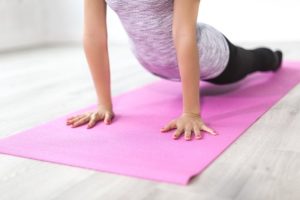Managing your health should be easy but for many people it can also be a challenge. As well as looking after your family, your partner, children and holding down a job, looking after your health can often go to the bottom of the list. For too many women, before they know it, the effect can result in stress or illness.
These are challenges that people go through in their daily lives, but when situations change like losing their jobs, marriages or other stressful situations, looking after your health can go to the bottom of the list. Let’s look at into some of the key areas that you need to focus on make your health a priority.
Sleep
Getting an adequate amount of sleep can be challenge for many people, especially if your natural cycle is out of sequence. The best way to maintain a good sleep pattern is to maintain a regular cycle, for example, go to sleep and wake up at the same time and eat regular meals at the same time. This can be a challenge for people who may be working from home where they are juggling so many tasks that they run out time to get their work completed and stay up later than normal in order to get work done.
We have noted the importance of a regular routine, but there are other factors that can help like not using a bedroom as an office if that is possible and not looking at electronic devices just before bed, which is a challenge for many people who usually want to look at their messages before bedtime.
It is also important to aim for 7-9 hour of sleep every night, 8 is the ideal recommendation. Other strategies to help you sleep include, avoid napping during the day, drink caffeine before noon and getting regular exercise every day. Exercise, both aerobic and resistance, can have positive effects on your sleep patterns although some experts have noted that it is best to have this exercise earlier in the day, or to at least avoid active exercise one hour before bedtime.
Exercise
There are so many benefits of exercise, it can make you feel better as it increases the endorphins in your body which are the feel-good hormones. It doesn’t seem to matter how much you work out, whether you walk, jog, sprint or practice yoga, it balances your mood and some studies have shown that it can decrease depression.
The issue for many women, especially as we get older and approach perimenopause or actual menopause is that we get more tired and are less likely to want to exercise. In fact for some of us, even 5 minutes of exercise can seem like a real chore. When you think of the benefits in terms of weight loss, better sleep, being less moody and increased energy levels, the benefits are huge, the challenge is actually doing it.
If we can’t do it to keep fit or lose weight, we should think of the fact that exercise can reduce your risk of chronic disease such as heart disease, diabetes and the weight around the middle that is often harder to shift as women get older.
Another benefit is that it can improve your brain function which is important as women get older as brain fog and not sleeping properly is one of the many side effects of menopause. Another plus is that it can increase our body’s production of natural oxidants which can contribute to the health of our skin and potentially delay the effects of aging.
Lastly, and not least, it can increase ouu energy levels. The issue is having the energy to stick to a routine. We can start with maybe 5 minutes a day, there are simple exercises that you can do at home such as jump rope, star jumps or running up and down the stairs.
Finding the energy to do something that will in turn boost your energy and provide so many health benefits should be easy. It’s such a shame that it isn’t. There are many programs that can support this. A good example of one of these is Lean belly Breaktrough which is a program covering a 2 minute routine that when practised every day can help a person’s overall health.
Eat Healthily
Eating healthily can be a challenge for most people at the best of times but when you are at working at home, it is easy to be tempted as the kitchen is very often not far away. This leads to snacking, a little habit to form to avoid snacking is to save a treat for yourself after dinner. This helps you to stop thinking about all the treats in the fridge and leaves you with something to look forward to after dinner.
Another strategy is to plan your meals and snack sout for the week. This also helps with shopping and can stop you from putting those dreaded snacks in your basket. Alongside this strategy, you could also try planning your meals in advance, this stops you from running out of inspiration and can stop you from having a junk food meal to make you feel good.
Keep a check on the nutrients in your food too, is it balanced, which means it should have the required levels of starch, protein and vegetables or a salad? Also, cook enough for dinner the next day, or cook something that can be frozen for those days when you don’t feel like cooking.
If you like eating fish, try eating oily fish such as salmon, which contain rich sources of vitamin D, this is good if you aren’t getting the sunshine you need by going outdoors.
Drinking lots of water is also important to keep your body hydrated throughout the day. Very often, if you are working it’s easy to forget to drink as much as you need to, which is 8 glasses of fluid a day, so always keep a bottle with you. It takes a while to get into the habit, but it works wonders for your digestive system.
The basics of eating and healthily involves planning and understanding the importance of putting your health first, only you can make the decision to do this.
Anxiety and Stress
Maintaining your mental and emotional health is very important for your overall health and well-being. Its normal to experience anxiety and there are many occasions when this can be issue such as relationship, work, or anxieties around your health or the health of your family. Sometimes the worry could be around the future, where you are worrying about your children or elderly parents, there are so many reasons that can trigger anxiety but when it starts it can very often be overwhelming.
There are a few strategies that we have found to work when we have felt overwhelmed. A major technique includes focusing on the present. A lot of worry is often focused on the past or the present. This is often easier said than done, but a simple meditation technique practised regularly throughout the day can help, and if you are religious, you could pray instead.
Another technique we have found to be useful is to break the pattern when a negative thought comes into your mind. Train your mind to switch to another thought such a nice holiday or event with your family. This won’t take away the issue at hand, but it can help you to deal with the issues causing the stress easier.
Talking to someone is the easiest and probably most powerful tip that we can offer. Whether it’s a friend, your partner or a counsellor, the power of talk therapy cannot be underestimated.
You could also just take some time out, reduce your schedule, take up a new hobby, watch a relaxing tv show. A few moments daily of me time can work wonders for your mental help and is perfect for reducing stress.
At some stage during a stressful period in your life you are going to have to face your fears. We can soothe ourselves but usually the issue won’t go away until you face it and have a plan of action. Very often the stress and anxiety can stem from focusing on the worst outcome, but if you talk it through with someone who understands your situation, the stress can be reduced, especially if you have a plan of action in place.
We have noted that exercise, healthy eating, sleeping well and talking to someone who understands your situation are powerful easy remedies to relax your mind and body. Just a few simple changes can give you that sense of peace and well being to deal with any situation in life. Remember it all begins with a simple decision.




